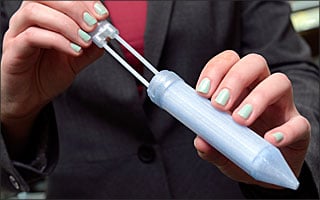Selected as their biomedical engineering design project last fall, Sydney Rooney — student design team leader and recent BME graduate — and seven Johns Hopkins undergrads have developed a battlefield blood-loss prevention system that has recently received testing approval.
The problem: Without prompt care, a badly wounded soldier can easily bleed to death while being transported to a distant medical station. Traditional treatments, tourniquets and medicated gauze pads, often cannot stop the blood loss from a deep wound at the neck, shoulder or groin.
The team’s solution: To give soldiers a fighting chance at survival the student team developed an injectable foam system that fills the wound area and blocks blood loss in the critical first hour prior to receipt of more advanced medical help.
The student inventors showcased their project entitled “Controlling Pre-hospital Junctional Hemorrhage in Trauma Patients” and their device at the annual Johns Hopkins Biomedical Engineering 2014 Design Day. The battlefield wound treatment received a faculty award for best design process and a second-place audience choice honor for its poster.
The students have now received university approval to begin animal testing of the prototype system. The students plan to work with their faculty advisers and medical sponsors to determine how to move the project toward further testing and eventual adoption and use in military settings.

